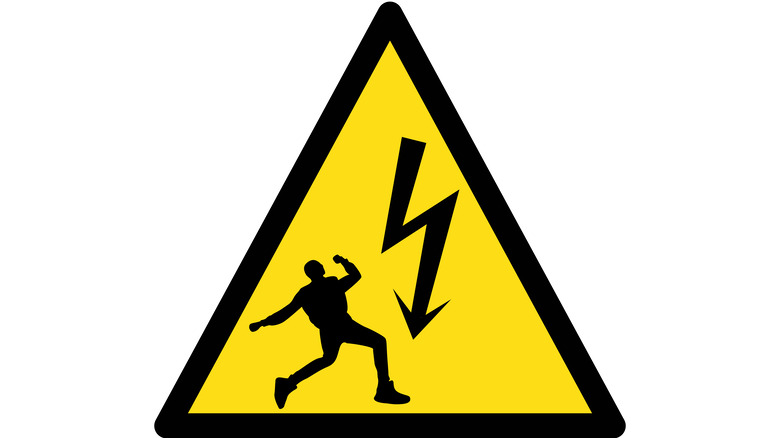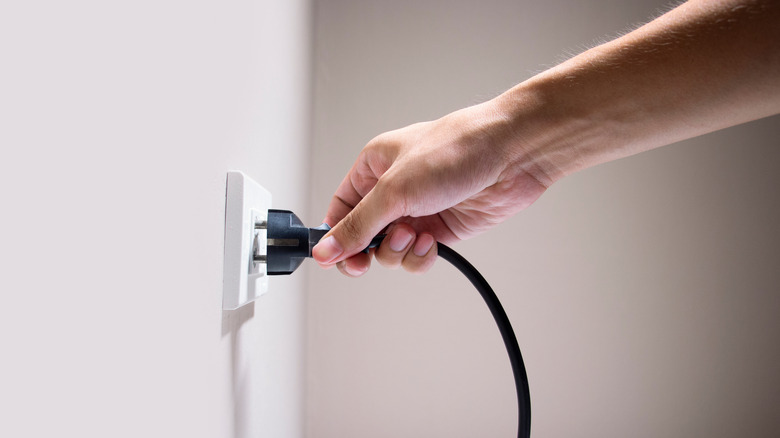What Dying Of Electricity Really Does To Your Body
More than 300 people die every year from electrocution, with thousands more being injured from electric shocks. Many of these injuries happen at the workplace, with workers in the construction, repair, and maintenance professions being at a higher risk (via Electrocution Lawyers PLLC). But it's also surprisingly easy to die by electrocution at home. People have been electrocuted after touching an improperly wired landscape light, touching an electric boat lift, and touching a light pole on the expressway (via Leesfield Scolaro Personal Injury Lawyers). Death by electric shock is more common than people think; it's currently the fifth more common cause of accidental death in the country.
Most people who suffer an electric shock survive, but for those who don't, it's often not an easy death. Death by electric shock is agonizing, as the electric current can produce very strong and painful contractions in the muscles as well as burns, according to Just Energy. It also affects the electrical current in the body, so it can cause difficulty speaking and lead to some people passing out, which is often a blessing in disguise, as there's no pain once you're no longer awake.
Experiencing an electric shock
Electrical shocks are never fun, but there's a big difference between feeling a mild shock and your life being at risk after coming in contact with electricity. According to WebMD, somebody suffering an electric shock could suffer severe burns, especially at the point of contact, but it's also possible to experience everything from a broken bone to spinal injury (if you "fly off" the source of the shock) to cardiac arrest.
Electric shock survivor Samantha Richards suffered second-degree burns on her arm and temporarily passed out when she and a friend accidentally came in contact with a cable wire in the wall. While at the hospital, she discovered she could have died if she had been wearing a different type of footwear; turns out her thick UGGS boots had absorbed some of the electrical shock (as reported via Health).
So why do some people survive electric shocks and others don't? It's partly due to the current that flows through the body at the moment of the shock, and not necessarily the voltage produced by the source, according to Britannica. This means a shock from a standard electrical outlet, which produces a current of just 60 hertz, is enough to cause death (via Britannica and KTEN). While it's possible for a strong electrical shock to cause death because of internal burns to tissues and organs, most electricity-related deaths are connected to the heart, according to Hydro Québec.
How does electricity cause death?
Britannica points out that heart-related deaths by electrocution can happen in three ways. The most common is ventricular fibrillation. Ventricular fibrillation is basically a heart arrhythmia, meaning the heart pumps irregularly and cannot send enough blood to the rest of the body. It results in chest pain, shortness of breath, a very fast heartbeat, and it always requires emergency care (per Mayo Clinic). This is caused when an electrical current enters the body and directly affects the heart's own electrical activity. If not treated quickly, it can lead to the heart stopping, according to University of California San Francisco Health. Prisoners executed in the electric chair die from ventricular fibrillation caused by a high-intensity electric shock (via The Register).
An electric shock can also cause death by paralyzing the heart or the breathing center in the brain, according to Britannica. Electrocution can also cause cerebellar hemorrhage (bleeding in the brain), but this is more rare (per a 2020 article in Trauma Case Reports, posted at Science Direct). This is because, according to Britannica, most deadly electric shocks are received through the hands and arms (or sometimes the legs) and this has a direct path to the chest and the heart, which means most electricity-related deaths are connected to heart failure and the heart stopping. With a quick response, it might be possible to restart the heart after it has stopped because of an electrical shock. CPR and the use of an automated external defibrillator (AED) are essential to help, and these must be used immediately or death will occur within minutes, according to Mayo Clinic.


